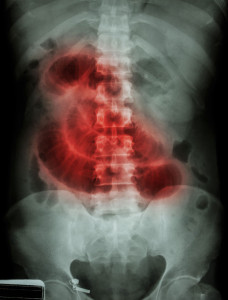Introduction
The word “ileus” comes from the Greek word “ileos” . It is a condition where there is a bowel blockage for a period of time.
Symptoms
There is bowel distension, abdominal pain and vomiting of dark bowel contents with a fecal smell. Along with this comes toxemia (blood poisoning), dehydration and if neglected shock and sepsis.
First of all, the examining doctor will fail to hear the normal bowel sounds on auscultation of the abdomen. Another sign are distended bowel loops that can be seen on plain X-rays of the abdomen. Furthermore, ileus can happen post-surgically after intraabdominal surgery. Finally, in a newborn it can also happen due to thickened meconium.
The stomach and the small bowel recover usually within 24 hours after surgery. However, the large intestine takes much longer to recover its peristalsis, in the order of up to 72 hours. As a result this leads to a backing up of the bowel contents at the level of the colon.
Treatment
The mainstay of therapy is decompression. The physician does this by providing continuous nasogastric suctioning through a nasogastric tube hooked up to a vacuum machine.
In the first place, the patient cannot eat food until the bowel sounds reappear and the patient passes gas. The lab measures potassium levels frequently as a low potassium level can also contribute to the ileus. The physician gives intravenous fluids to treat dehydration. When the patient starts to pass gas, the diet is gradually built up from fluids to a full diet over a period of three days.
References
1. DM Thompson: The 46th Annual St. Paul’s Hospital CME Conference for Primary Physicians, Nov. 14-17, 2000, Vancouver/B.C./Canada
2. C Ritenbaugh Curr Oncol Rep 2000 May 2(3): 225-233.
3. PA Totten et al. J Infect Dis 2001 Jan 183(2): 269-276.
4. M Ohkawa et al. Br J Urol 1993 Dec 72(6):918-921.
5. Textbook of Primary Care Medicine, 3rd ed., Copyright © 2001 Mosby, Inc., pages 976-983: “Chapter 107 – Acute Abdomen and Common Surgical Abdominal Problems”.
6. Marx: Rosen’s Emergency Medicine: Concepts and Clinical Practice, 5th ed., Copyright © 2002 Mosby, Inc. , p. 185:”Abdominal pain”.
7. Feldman: Sleisenger & Fordtran’s Gastrointestinal and Liver Disease, 7th ed., Copyright © 2002 Elsevier, p. 71: “Chapter 4 – Abdominal Pain, Including the Acute Abdomen”.
8. Ferri: Ferri’s Clinical Advisor: Instant Diagnosis and Treatment, 2004 ed., Copyright © 2004 Mosby, Inc.







